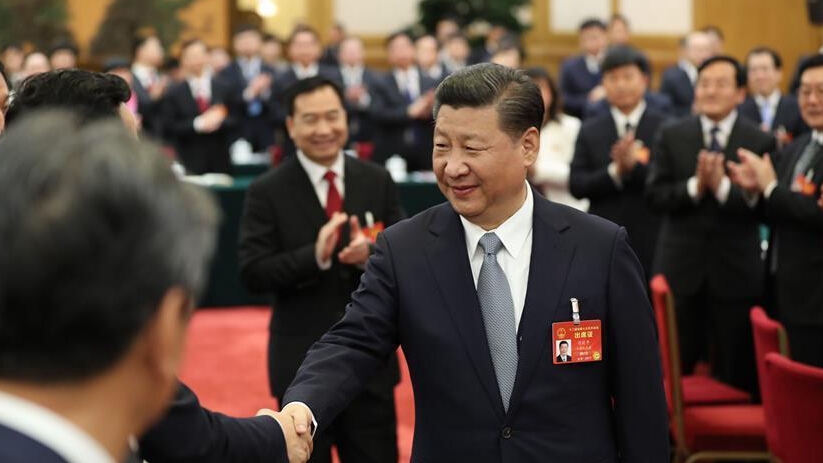Xi Jinping: The leader of a great revival
 0 Comment(s)
0 Comment(s) Print
Print E-mail China Daily, March 15, 2017
E-mail China Daily, March 15, 2017
Can China do it? This is the crucial question for the world's biggest and boldest economic, political and social experiment. At the core of understanding the country's prospects is the governance philosophy of its leader, Xi Jinping.
|
|
|
Chinese President Xi Jinping joins a panel discussion with deputies to the 12th National People's Congress (NPC) from Liaoning Province at the annual session of the NPC in Beijing, capital of China, March 7, 2017. [Xinhua/Ding Lin] |
Xi is leading more than 1.3 billion people on a march toward the Chinese Dream-bringing an end to poverty and rejuvenating a nation that has already made astonishing progress in creating prosperity.
The 63-year-old reformer has brought his own thinking to bear on problems down the road, especially after a year of tumultuous global events.
With the needs of the people his first and foremost concern, Xi's experience, commitment, determination and ability to govern and lead have become something of a rarity on the global political stage.
This year, the 19th National Congress of the Communist Party of China will elect new leaders for a five-year term, covering a crunch period for Xi's vision of a well-off nation by the Party's centenary in 2021.
China's GDP is forecast to exceed 90 trillion yuan (US$13 trillion) by 2020, when the nation is expected to have a middle-class population of about 400 million.
The goal is fast approaching and will only be met if officials at all levels align their thinking with that of the central leadership and act according to Xi's "Four Comprehensives"-the cornerstones of prosperity, reform, rule of law and strict Party governance. The strategy aims to lead the country to modernization and standing at the center of the world stage.
This is China's own story, one neither copied from nor imposed on any other country.
New thoughts, actions
At this year's sessions of the State legislature and political advisory body, Xi expressed his confidence: "As long as we gather the wisdom and strength of more than 1.3 billion Chinese people, there can be no limit to the success of our cause."
From being the youthful head of a poor village in northwestern China to Party chief of the nation's advanced eastern regions to leader of the nation, Xi has shown a deep understanding of governance, evident in economic and social reform, foreign affairs and military transformation.
He has led China to achieve remarkable economic growth, even though other major economies are faltering. The country contributes more than 30 percent of global economic growth.
Xi calls the current phase the new normal, from which an economy is emerging that is more sustainable and inclusive. To ensure this rebalancing succeeds, he has put forward supply-side structural reform.
Fundamentally different from the supply-side economics of the West, Xi's policy takes a harsh stance against inefficient industries and replaces them with new, innovative systems of work and production that will neither destroy the environment nor succumb if another global financial crisis hits.
China hopes to increase GDP by about 6.5 percent this year. At this rate, the nation will generate more output than it did during the days of double-digit growth.
Xi is at the wheel of a reform juggernaut, revitalizing almost every aspect of the economy and society, from the financial sector to healthcare. Changing the lives of hundreds of millions of people means the abandonment of what is no longer relevant, including the one-child policy and "re-education through labor", a method of dealing with minor offenders introduced more than 50 years ago.
He emphasizes the rule of law and checks on power, as seen in his decision to create a national supervision commission. Lawmakers are also compiling a civil code to better protect people's rights.
Xi's campaign against corruption-he has warned that graft could destroy the Party and cause the downfall of the State-has gained "crushing momentum". Since the 18th CPC National Congress in 2012, at least 240 senior officials and more than 1 million lower-level officials have been investigated.
As Chinese businesspeople, tourists and students reach almost every corner of the globe, Xi sees China as not only a beneficiary of globalization, but a contributor to it. He has visited about 50 countries as head of state, pursuing his mission to build "a community of shared future".
His strong defense of free trade and warnings against protectionism have surprised and delighted observers.
China's trade relationship with the United States "supports roughly 2.6 million jobs in the US across a range of industries", according to a report in January by the US-China Business Council based in Washington.
The Belt and Road Initiative proposed by Xi in 2013 is expected to connect Asia with Europe and Africa. In three years, Chinese businesses have helped build 56 economic and trade cooperation zones in 20 countries along the Belt and Road routes, with total investment exceeding $18 billion. They have helped generate more than $1 billion in tax revenue and create more than 160,000 jobs.
China's commitment to the Paris agreement on climate change is also comforting and unshakable.







Go to Forum >>0 Comment(s)